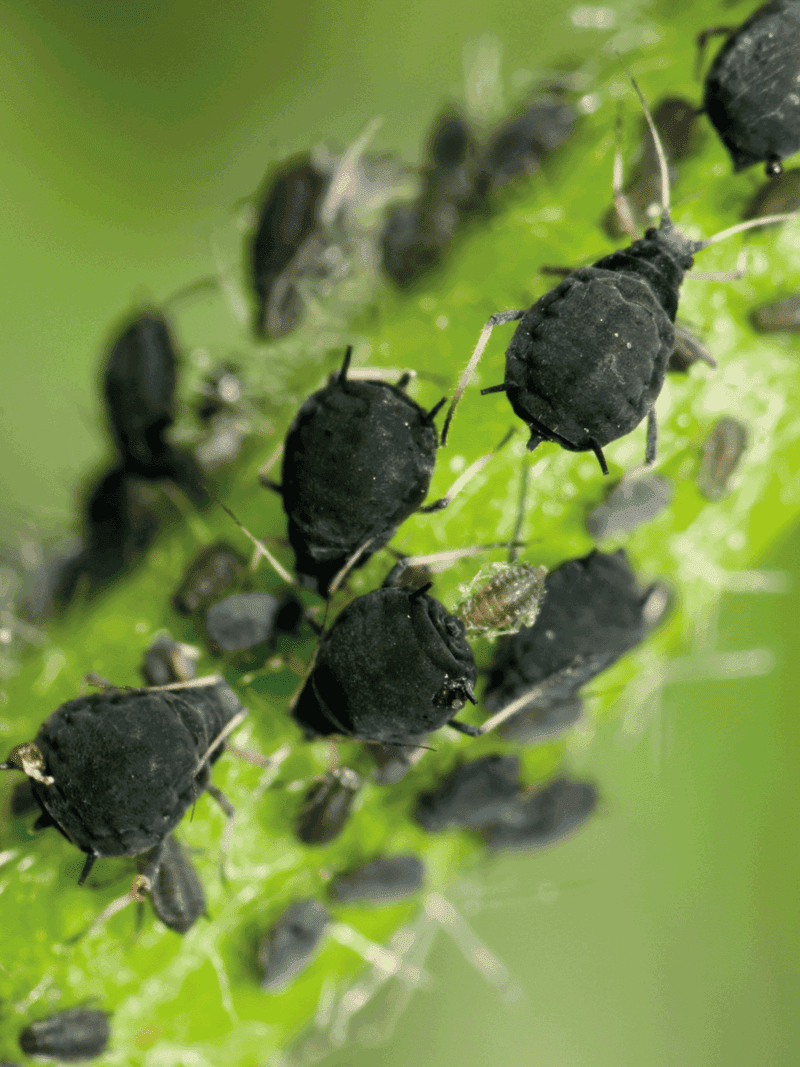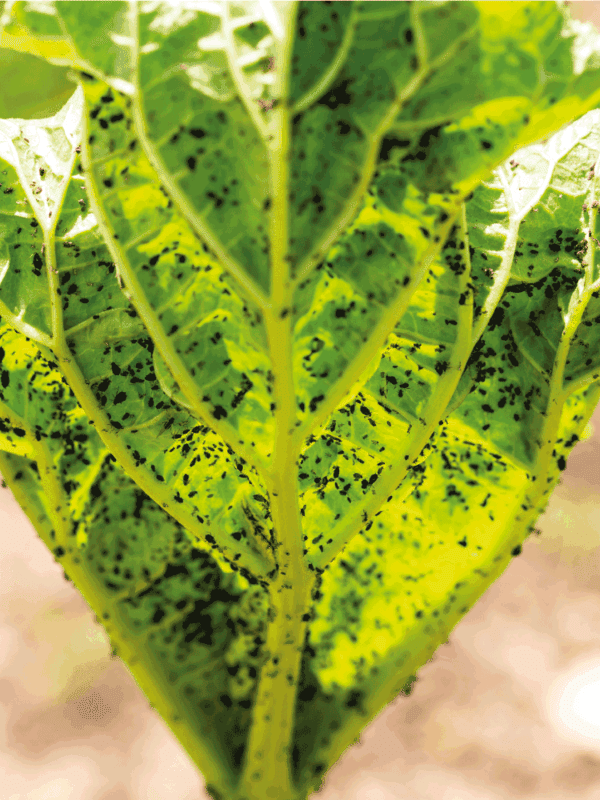Black aphids are small insects, a little under 1/4 of an inch in size, that love to infest indoor and outdoor plants. If you see these vampiric insects sucking the life out of your plants, you may wonder how to get rid of them. We researched some helpful solutions to deter black aphids from hanging around and eradicating their eggs. Check out our list of mostly natural methods to remove black aphids and discourage their presence on plants.
Consider using the following methods to get rid of black aphids on plants and your property.
- Make a solution using liquid dish soap and apply to plants.
- Use a solution including white vinegar and apply to affected areas.
- Spray a commercial insecticide.
- Knock black aphids off of plants using high pressure water.
- Surround problem areas with plants that black aphids cannot stand.
- Apply oils to deter black aphids and kill any eggs.
- Dust your plants with diatomaceous earth.
Don't let the sight of black aphids get you down, there are multiple methods that can keep these insects at bay.
![Close-up-of-Hand-Holding-Cherry-Tree-Branch-With-Aphids.-How-To-Get-Rid-Of-Black-Aphids-[A-Complete-Guide]](https://gardentabs.com/wp-content/uploads/2021/08/Close-up-of-Hand-Holding-Cherry-Tree-Branch-With-Aphids.-How-To-Get-Rid-Of-Black-Aphids-A-Complete-Guide.png)
Keep Pesky Black Aphids At Bay
At first glance, you might not notice black aphids on plants with the naked eye. However, if you give a plant a closer look, you may notice these soft-bodied, wingless insects feeding on leaves, stems, and buds.
Similar to other aphids that are yellow, green, white, red, or brown, black aphids have a piercing mouth that helps them suck out plant sap. If you notice a plant's leaves are curling, yellowing, or misshapen, and areas of the stem and leaves are coated with sticky sap, black aphids are a likely culprit.
![Colony of small black aphids on an elder leaf stem. How To Get Rid Of Black Aphids [A Complete Guide]](https://gardentabs.com/wp-content/uploads/2024/04/Colony-of-small-black-aphids-on-an-elder-leaf-stem-edited.png)
Keep in mind, black aphids are attracted to plants that are over-watered, over-fertilized, and have lots of new growth. Thankfully, there are plenty of ways to dissuade black aphids from sticking around, and removing an infestation. Be proactive and take measures to reduce the likelihood of black aphids dining on your plants.
The saliva these insects leave behind when piercing a plant and sucking out sap leads to plenty of problems. Put a stop to plant lice, or black aphids from taking over and making a feast out of your beloved plants.
Use Liquid Soap
Make a solution of liquid dish detergent and distilled water to keep black aphids at bay and off of plants. Mix 1 tablespoon of soap to 1 quart of water. If you have a significant amount of plants to spray, use 5 tablespoons of soap for every 1 gallon of water. Apply the solution with a spray bottle or wipe down the leaves, stems, flowers, and anywhere you see aphids.
Check out this liquid soap on Amazon
Apply White Vinegar
You will want to use a ratio of 1 to 3 when creating a solution of distilled white vinegar and distilled water to rid plants of aphids. Make sure to spray the solution all over the plant, targeting areas where aphids like to hide, such as underneath leaves. Repeatedly spray the solution on the stems, leaves, buds, and flowers of a plant until the numbers of aphids dissipate.
Check out this white vinegar on Amazon
Commercial Insecticide
Purchase a commercial, approved insecticide and follow the manufacturer's directions for application. Coat the plants and any visible aphids as directed, and give yourself enough time to repeat treatments as needed to see results. Check to make sure there are no unwanted side-effects to the insecticide you use and that it is effective.
Check out this 3-in-1 product on Amazon
Garden Hose
If you are in a pinch and don't want to use any chemicals, grab a garden hose to blast away aphids off of plants with cold water. Use this method if you have a small number of aphids and not a full-on infestation. Once aphids have been knocked off and any sticky sap has been removed, the insects are less likely to return.
Choose Plants Black Aphids Dislike
Make a host plant less comfortable for black aphids to call home and surround it with plants aphids and other pests hate. Deter aphids from infesting plants and keep marigold, dill, catnip, cilantro, fennel, garlic, and mint around. Aphids will have their senses thrown off by certain plants with an overpowering fragrance.
Apply Oil
Embrace the power of essential oils to keep aphids off of precious plants and deter them from an infestation. Create a solution of distilled water mixed with 4 to 5 drops of clove oil, neem oil, peppermint, rosemary, and thyme. One essential oil that aphids hate most is lavender. Spray the underside of leaves and tops, steps, flowers, and around the top layer of soil to make aphids flee.
Check out this neem oil on Amazon
Use Diatomaceous Earth
Create a barrier between your host plant and black aphids using diatomaceous earth. You will need to sprinkle this substance on the top layer of soil, on leaves, flowers, and anywhere aphids are visible. Please note, using food-grade diatomaceous earth will reduce to a fine powder, making it easy to coat plants and deter black aphids and other insects.
Check out this food grade diatomaceous earth on Amazon
What Causes Black Aphids?
Aphids do a lot of damage in the late spring and when the weather is warm but not terribly hot. If there are no nearby plants that deter black aphids from their target, you are over-watering or over-fertilizing plants, and there are no natural predators of this insect around, you may experience problems.
Also, aphids often show up when something is amiss, such as a drought, or a plant is under a lot of stress. Keep black aphid numbers low by treating your plants regularly, knocking off any visible plants, and killing eggs. Be careful about the plants you keep, as aphids love nasturtium and mustard.

Are Black Aphids Harmful To Plants?
If you notice black aphids on your plants, remove them as soon as possible. An infestation of black aphids leads to stunted plants, sticky leaves and stems, and a lot of frustration. The saliva that aphids inject into plants creates a host of problems, making it difficult for plants to heal and thrive.
Aphids depend on draining the sap out of plants, seeking sustenance by piercing roots, leaves, stems, and buds. Without intervention, black aphids can quickly multiply and become very challenging to eradicate and control.
What Do You Spray On Black Aphids?
If you discover black aphids on your plants, consider spraying them with a strong stream of water, insecticides, or a solution of dish soap or vinegar to get them to leave. Another option is to spritz black aphids and host plants with a diluted solution of neem, thyme, rosemary, clove, and peppermint oils. Try your luck with commercial products or create a natural spray to get rid of aphids and their eggs.
Will Vinegar Kill Black Aphids?
A natural solution to remove aphids from host plants is to use vinegar. Because vinegar contains acetic acid, spraying aphids with this substance burns them and clogs their pores. Spray plants with a solution of distilled water and vinegar once a week until the aphids are gone.

How Does Dish Soap Kill Aphids?
Get rid of troublesome aphids by applying soapy water to the leaves, stems, and flowers of plants. You only need a couple of drops of liquid dish detergent mixed with water to be effective. Apply the soapy solution every 2 to 3 days up to 2 weeks until you get results.
How Do You Get Rid Of Black Aphids Permanently?
Take a layered approach to get rid of black aphids permanently, and use multiple solutions for long enough until successful. Encourage predators to aphids to hang around your plants. Surround host plants with fragrant, repelling plants like marigold, dill, catnip, and cilantro. Choose a product to spray and wipe down plants often, which also deters aphids.
In Closing
We hope you feel more confident about getting rid of back aphids that are infesting and damaging beloved host plants. Create an environment where natural predators of aphids are encouraged to stick around. Consistently apply a natural or commercial product to plants and aphids to deter them and kill their eggs.
Take preventative measures to reduce anything that makes aphids more attracted to plants. Avoid over-fertilizing, over-watering, and look after stressed-out plants. You can remove black aphids and discourage them from coming back with the right treatment.
Before you go, check out the following helpful articles of interest:
Read More: 5 Of The Best Plant-Safe Bug Sprays And Bug Bombs
Read More: How To Get Rid Of Japanese Beetles [An Exploration Of 8 Methods]





